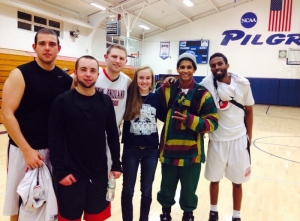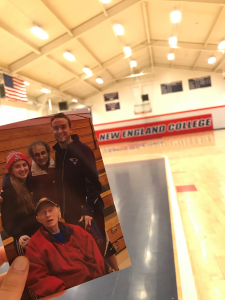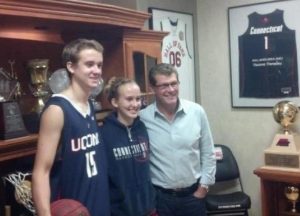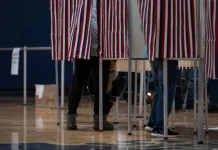It often takes years and years to build a college sports program. Even teams like the University of Connecticut women’s basketball team did not start as the powerhouse they have become. When Geno Auriemma took over the program in 1985, the team went 12-15 overall, 4-12 in the conference, and lost their first-round conference tournament game. Today, the Huskies ended the 2016-2017 season with a 111-game winning streak, losing their dream of a 12th title and 8th undefeated season at the buzzer in the Final Four to Mississippi State.
While New England College is smaller in size, the pursuit of success is the same. But should success only be measured by wins and losses?
Henniker, New Hampshire prides itself on being the only Henniker on Earth, though most people have never even heard of it. NEC, at the heart of this small town, is where head coach of the men’s basketball team, Charlie Mason, wrapped up his 15th season this past February. Since my father was an assistant coach for Mason the past 13 years, I’ve met many players, but when I was running through my memory banks for this article, a particular name came to mind.
At a young age I would attend the end of the year banquets with my father, and each year the same man would speak about the program, David Pilla. An NEC alumnus (1990-1995) and member of the NEC Athletic Hall of Fame, Pilla never actually played under Coach Mason. Being an active alum, Pilla said he received a call from Mason when he became the head coach and “the rest is as we say… history.”
“Knowing that I never played for Coach Mason, my experiences with [him] are pretty unique in that we’ve become so close over a long period of time…,” said Pilla.
He sponsors an end of the season dinner for the team, and has attended many in past years. The coach’s award was even renamed to the Dave Pilla award in 2002.
In his last two seasons Pilla had two different coaches, with two different philosophies and two different coaching styles. He remembered it was a difficult time of adjustment after redshirting his senior season due to injury. Constant change in coaches prohibits a program from establishing any consistency or flow.
Pilla pointed out, “What Coach Mason has done for the school, forgetting the wins and losses because they are few and far between…we’ve had some really good seasons and bad ones… he has brought a level of stability that I didn’t see.”
He compared this to building the foundation of a house. That “rock solid foundation” is what holds up the house, and you may have a “new bathroom” and “new color on the walls” but the foundation is “the key takeaway.”
Establishing a foundation when Coach Mason first arrived was essential.
What makes Pilla and Mason’s relationship unique is the bond they created because of how invested they each are in the program.
“My trust, respect, and commitment for Dave goes beyond words. We tell our players all the time: “greatness is the ability to make others better.” Dave Pilla exemplifies this outlook as well as anyone I know,” said Mason.

Tim LaTorra (2001-2004) was a sophomore at NEC when Mason, who left Johnson State, arrived at New England College. LaTorra described himself as “not what you would call a great student” coming out of high school, but basketball gave him the opportunity to continue and improve his academics.
“My freshman year was interesting to say the least,” said LaTorra. “Aside from basketball, there was no focus on grades or community service. Teammates of mine would party and drink alcohol before games, and the day of it. It was not like anything I have ever seen through my high school experience. As an impressionable eighteen-year-old, I thought that is what happens at college and was really unsure of what to do.”
To an eighteen-year-old who already wasn’t the best student to begin with, being surrounded by that type of behavior would push one towards an unsuccessful college career in athletics and academics.
“When Coach Mason came in as the coach my sophomore year, it probably saved my academic life.” Starting the season with only seven players, Mason began implementing programs, some of which are still a part of the Pilgrim way today. “He implemented mandatory study halls, reading programs with the local youth, a GPA goal for everyone, and taught us core values within the basketball program.”
Those core values include “trust, respect, and commitment,” and are the values Coach Mason stated as key to getting players to buy into his system.
Along with improvements among the team, Mason also jumpstarted the move to improve the gym itself.
He was responsible for new paint on the walls, new backboards, new mats on the walls, a new scorer’s table, and new bench chairs.
15 years later, improvements to Bridges gym still include new paint, new wall mats and a

new scorer’s table. Mason believes these improvements clearly make a “positive impact” on recruiting because, “While competing with other competitive programs (who possess updated facilities) for blue chip players – facilities play a role in the final decision.”
Looking back, LaTorra remembers Mason making “the college experience and life much larger than just basketball.” This concept can often be lost in college athletics.
“He emphasized that the philosophy is about developing the human being first, strengthening the student second, and the basketball player third.”
The life lessons of building character and family impacted recently inducted NEC athletics Hall of Fame member and thousand-point scorer, Patrick Quinn (2003-2007).
Quinn played with LaTorra for two years, in which the Pilgrims went from an overall record

of 4-21 (‘03-‘04) to 12-14 (‘04-‘05). As a self-proclaimed “mama’s boy”, he found solace in the coaching staff after having a tough transition to life away from home. One assistant coach in particular, the late Richard Sizer, became a grandfather figure to him. Coach Sizer and his wife were and are still seen as family to players of the past and present.
“Another [assistant coach], Coach Pap was like an older brother [to me], who I still talk to often,” said Quinn. “Coach created a family atmosphere and even though I’ve had some knucklehead brothers they’re still my brothers.”
The improvement from Quinn’s first year to his second included the addition of another future thousand-point scorer, Ryan Jaziri (2004-2008). Jaziri emphasized how the atmosphere created by Mason made it possible for “core groups” to stay together to create “more success for the program.”
“I always appreciated the effort he put in and how much he cared,” said Jaziri. “I owe a lot to Coach Mason and think he’s a great influence on guys who buy into the program.”

That sense of family between each member of the team was not only key to player development, but became a part of the program. Andrew “Amac” MacDonald (2006-2011) shared the same sense of family as his fellow Pilgrims.
“The assistants that I’ve had at NEC made a very big impact in my life and still have a positive impact to this day,” said Amac.
Even after Coach Sizer’s passing last summer, alumni seemed to pick up right where they left off, reminiscing about the days of being a Pilgrim. For many it’s “forget[ting] the x and o’s and wins and loses” because they value what they gained from being a part of the program.
Adjusting to life in college is a common struggle. In order to be eligible for play in the NCAA a student athlete must be enrolled in 12 credits and maintain and 2.0 GPA or higher, but some players need that extra support and guidance. Amac made the decision to transfer closer to home, to Bridgewater State, midway through his sophomore year.

“I wasn’t happy [with] the way things were going with basketball, I was getting home sick, I was young and not the smartest 20-year-old, and a few other personal reasons,” remembers Amac.
After transferring, he realized that commuting from home to a much larger school was not what he wanted.
“At a glance it may seem like transferring was a waste of time and money but it’s what I needed at the time and helped mold me into the person I am today,” said Amac, “One of the best decisions I’ve ever made was returning to NEC, but I think I needed that time away to realize what was best for me.”
Similar to LaTorra, Amac noted that he wasn’t the strongest academic student coming out of high school.
“I believe a big reason why I had good grades and finished with a GPA above 3.0 in college was because I was part of the basketball program,” said Amac. “I knew I needed extra support, and Coach Mason and the program really focuses on the importance of academics before basketball.”
Mason is a true believer of players being students before athletes.
“I believe there exists a clear correlation between students who are invested in their academic studies and their sports,” said Mason. “Find a young person who is committed to their academics and their athletic well-being and chances are you have someone who is dependable, goal oriented, and responsible.”
The importance of academics can often be overlooked when a collegiate program is solely focused on winning. The University of North Carolina Tar Heels recently won the 2017 Men’s Basketball National Championship, but it was overshadowed by scandal. As reported by CNN, the university had been enrolling student athletes in fake classes and giving them the high grades they needed to stay eligible. Though some colleges place athletics above academics, NEC—especially Coach Mason—holds their student athletes to a higher standard.
Players not only received guidance in academics but were also encouraged to get involved. Joseph Faragher (2006-2011) attributed the success of his college career to engaging in

what the college had to offer.
“Coach Mason’s support and passion helped keep me motivated to make a change… and that led to me discovering some of my capabilities as a young man,” said Faragher. “This helped me get involved with multiple clubs, residence life, and continue pursuing basketball which made my remaining college experience a good one.”
Similar to Amac, Faragher also left NEC during his sophomore year.
“One of the biggest issues I had was related to being away from home so this made some days tougher than others but basketball and the relationships I made had a big impact on getting me through my freshman year,” remembers Faragher.
Growth on and off the court is a common theme among the alumni.
Spencer Marzouk (8-12’) embodied one of Coach Mason’s key phrases, “you earn what you get, and you get what you earn.”” At the beginning of Marzouk’s freshman year he lost his mother; being from North Carolina he missed weeks of classes but never took time off from school, “that too was hard,” remembered Marzouk. Basketball wasn’t off to a great start for the young freshman either.
“To top it off we lost more games than the Cleveland Browns. Might have been the worst record in the country at 2-22. Engraved in my head.”

But Marzouk used the combination of traumatic and disappointing experiences as fuel to make the most of his next three years at NEC.
“In less than two seasons we went from arguably the worst team in the country to the best record in school history. In three years’ time, I went from not able to attend class and a borderline drop out to giving the commencement speech as the Class President [and] recipient of the Top Business Award.”
While Marzouk went on to experience another tragedy, losing a close friend to a car accident his junior year, college for him “turned out to be the biggest growth period of my life,” noting even though it may not have been the most enjoyable.
“I owe so much of that to Coach Mason and his staff.”
The passion often used to describe Coach Mason can be and has been interpreted in different ways by different players throughout the years.

Rafael Salado (06-11’) described a different relationship with Mason. He remembers it as “tough” and he takes responsibility for being “immature and a little selfish,” as most incoming freshman are.
“NEC was a culture shock especially coming from the city. If I wasn’t involved with basketball, Res Life, Rec & work study I would have been bored out of my mind,” remembers Salado.
He also attributes the disconnect to the surrounding environment. “Some players respected him [Coach Mason] and some did not. So, a positive environment was never really consistent and established.”
Getting players to buy into your system as a coach is not always easy. At any level, if a

majority or not all of the players on a team listen to and respect the coach and the coaching staff, it will be difficult to establish any type of consistency.
“The way Coach runs a program can be very difficult to buy into at first but the longer you play with him and the more you’re around him, the more you respect him for everything he does,” said Amac.
The program and its core values have been the same since I was attending Junior Gym Grim camps in the first grade. During each summer camp and clinics in the fall, I was taught the student in student athlete is just as important as the athlete.
“I believe our program centers on the growth of the person; the student and the athlete,” said Mason. “In regards to athletics: we focus on resiliency; passion and teamwork.”
Jaziri and Faragher, whose athletic careers overlapped for two years, shared a similar view in how Coach treats his players now versus when they were playing.

“Coach Mason has taken a more laid back approach to coaching, while still getting the most out of his guys,” said Jaziri. “He’s a driven and intense guy who loves what he does.”
Faragher took a slightly different angle, “He has his ‘roots’ and beliefs that make him the great man he is… Personally, I think he was a lot tougher on kids back in the day but he still holds people accountable, including himself, which has a lasting impact beyond the court.”
Faragher believes that Mason was tougher back in the day because it was a different generation of players.
“We live in a time where instant gratification is expected and sometimes people don’t deal well with constructive criticism,” said Faragher.
This feeling of change in the way players approach the game nowadays is seen throughout all levels of basketball.
“The same aggressive leadership style that may have been effective years ago may turn out to be ineffective today,” said Faragher. “There are still some expectations that need to be met by employees or players, but the means of obtaining those results have changed and will continue to change.”
Finding that balance between being too hard on your players and being too lenient is a fine line. Certainly, no coach wants to go to the extremes of throwing chairs like Bob Knight, but at times a disciplined approach has to be taken.
“I believe I am sincerely invested in our student athletes,” said Mason. “As a result, I want our student athletes to be equally invested in themselves. Trust, respect, and commitment are significant components to any relationship – and we try to underline this perspective when dealing with individuals and teams.”
Knowing how to handle players means knowing the type of person you are recruiting as a

Featured in the picture: myself, Mrs. Sizer, my brother and the late Coach Sizer ——–
“Good teams become great ones when the members trust each other enough to surrender the Me for the We.”
-Phil Jackson
coach. Mason believes in the “WE before ME” outlook from a quote by Phil Jackson.
“If your best player is not your best leader, the team is not going to realize its full potential,” said Mason. “I believe body language and character are components which need to be addressed when evaluating a recruit.”
If the character of the players around him matched their level of talent, Shane Hennessey (2007-2011) felt that his freshman year could have been a great one.
“My roommate would have gone on to average a triple double later in his career. Unfortunately, his NEC career lasted seven games,” remembers Hennessey. “I think it’s hard to judge a recruit’s character in a few emails and short meetings, maybe the hardest thing [is] to be sure you are recruiting quality character.”

Recruiting players that are willing to buy into your program as a coach is difficult if you do not focus on the player’s true character as much as their jump shot.
“I can’t say for sure but I think that Coach Mason, at that time, concentrated on the player rather than the person. With the talent that my recruiting class had I would speculate that we would have won a lot of games that year, except that [the] talent was not right for the program, for coach’s style, for Henniker, [or] for college even.”
Knowing you have recruited the right type of player for a program, as Hennessey pointed out, is difficult to see after short meetings and electronic communication. A coach does not know if a player will be willing to buy into the established system until the season has already started.

Mason believes that players need the Pilgrim core values of “trust, respect, and commitment” to buy into his program. “In my experiences, those student athletes who are not looking for such values often choose to walk away on their own terms.”
Mason’s ideals on recruiting are echoed by first year graduate assistant, a graduate and member of the men’s basketball team from Castleton University, Casey McGraw.
“The funny thing about recruiting is that every school has something different to offer. At Castleton, we typically sold recruits on the great facilities and team success,” said McGraw. “At NEC, we have some different things to offer. Coach Mason is one of the most passionate and best people you can find in this business which is really attractive to young student athletes and their families.”
McGraw is on the same page as Mason when it comes to recruiting character along with talent, “We have made a conscious effort to find good kids who want to be successful on and off the court, rather than just finding the most talented players.”
Before he left NEC to pursue his coaching career, former Assistant Coach Matt Kelly remembers the impact that working with Mason had on him.
“The program that Charlie has built is unique and special. The players I was fortunate to recruit and coach came from all walks of life and from all over the country and world. I maintain contact with some of the players to this day,” said Kelly. “Charlie showed me the power of building relationships with players, and not focusing on the short term. The relationships that Charlie builds are for life, and they have their growing pains like all relationships do and most college athletes don’t see the long-term goals until after a few years after college and then they understand it.”
Mason’s way of coaching basketball as well as coaching a way of life “rubbed off” on Kelly before his departure from the program.
“You never completely leave, Charlie keeps you connected and a part of me will always be a Pilgrim.”
The Pilgrims have had successful seasons and some not so successful seasons over the past 15 years. As Marzouk put it, “we may have lost more games than the Cleveland Browns,” to having seasons with winning overall records and conference records. But after finishing the 2014-2015 season with an 11-7 conference record and hosting a NAC quarterfinal game, the Pilgrims have missed the playoffs the past two seasons. These past two seasons have lacked upperclassman, with freshman making up a majority of the roster.
“Coach Mason is a very passionate individual, [he] out works other coaches but something is missing as to why NEC basketball can’t take that jump to the next level,” said Salado. “The resources, the talent and the support from the community is there.”
Heading into the 2017-2018 season, the Pilgrims have the ability to build upon the foundation that Mason started 15 years ago, in the days of Tim LaTorra. The upperclassmen have the potential to emerge as leaders, such as Patrick Quinn, Ryan Jazari, and Shane Hennessey did. They have the capability to reflect on their years as underclassmen to make the most of their remaining time such as Andrew MacDonalad, Joseph Faragher, Rafael Salado and Spencer Marzouk did. Most importantly, they have the power to establish a positive environment through pride, respect, and integrity.
The Pilgrim way.














